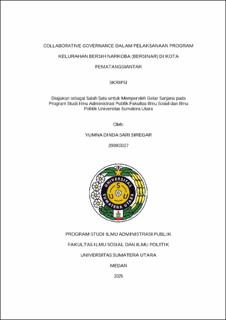Collaborative Governance dalam Pelaksanaan Program Kelurahan Bersih Narkoba (Bersinar) di Kota Pematangsiantar
Collaborative Governance in the Implementation of the Drug-Free Village Program (Bersinar) in Pematangsiantar City

Date
2025Author
Siregar, Yumna Dinda Sari
Advisor(s)
Rangkuti, Zoraya Alfathin
Metadata
Show full item recordAbstract
This research highlights the problem of drug abuse in Pematangsiantar
City, North Sumatra, which is a transit area and has a significant prevalence of
drug users. This city shows that there are 48 drug-prone urban village areas out of
53 urban villages, one of which is West Siantar District, especially in Banjar
Village, which is categorized as a drug-prone area, as well as an increase in the
number of drug users from 2021-2023, especially at the age (19-23 years) and age
(23-60 years). Factors influencing the increase in drug abuse at these ages include
lack of awareness and knowledge, economic conditions, unemployment, and
environmental influences. The most widely used type of narcotic is MET
(methamphetamine).
This research uses descriptive qualitative research methods. Research
informants included the National Narcotics Board of Pematangsiantar City, the
National Unity and Political Agency of Pematangsiantar City, the Head of Banjar
Village and the Banjar Village Community. Data were collected through primary
data and secondary data with data collection techniques in the form of interviews,
observation, and documentation. This research uses the Collaborative Governance
model according to Emerson, Nabatchi and Balogh (2012) which includes
Collaboration Dynamics, Collaboration Actions, Impact and Adaptation.
The results showed that collaboration in the implementation of the Shining
program was carried out first through joint decision making through coordination
meetings and community deliberations, in the implementation of the program in
accordance with Presidential Instruction Number 20 of 2020 concerning
RANP4GN & Minister of Home Affairs Regulation Number 12 of 2019 concerning
P4GN Facilities, as well as the Decree of the Mayor of Pematangsiantar City
regarding the Clean Drug Village Program (Bersinar). There are various
collaborative actions carried out by stakeholders such as conducting technical
guidance, soft kills training and socialization of the dangers of drugs. However, the
main challenges include low community participation, lack of human resources in
implementation, and limited budget resources. For this reason, there is a need for
involvement from the private sector in the fight against drugs and strengthening
regulations such as local regulations in order to have a strong legal basis for the
region in efforts to overcome drug problems and synergy among stakeholders in
facilitating P4GN.
Collections
- Undergraduate Theses [1957]
